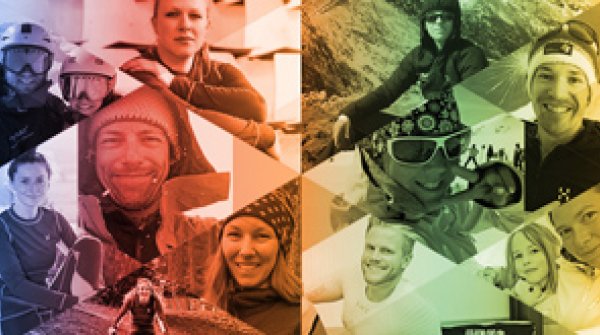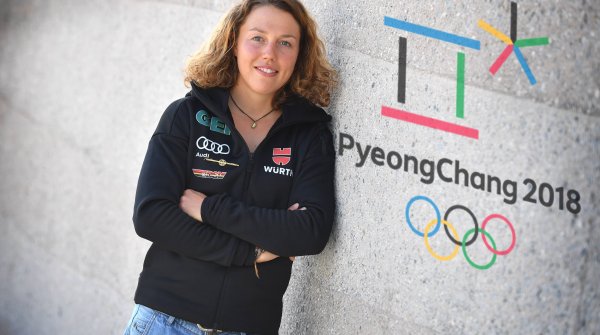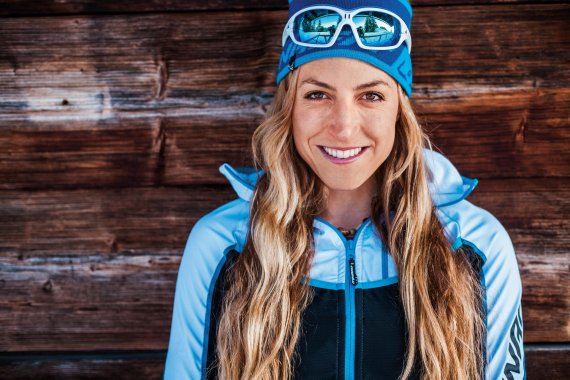
With support from friends, family, doctors, and physical therapists, driven on by boundless will, she fights back to life, with one goal always in sight: She wants to get back to the summit of this world. ISPO.com spoke with the 31-year-old Grasbrunn native in Munich.
Miss Allman, the most important thing first: how are you?
Gela Allman: I'm doing well today. Unfortunately I haven't made it back into the mountains, because there's so much hype at the moment. I went to physical therapist today, and since I wasn't doing so well yesterday, he really helped me today.
That means there are still highs and lows...
Yes, absolutely. I'm still missing three ligaments in my right knee: both cruciate ligaments and my LCL. On top of that I don't have a meniscus anymore, and I have broken cartilage on the right. And my nerve isn't completely back yet, either.
What do you still have in your knee at all?
Not much anymore. You know when it's just a ligament missing. Your knee is still a big construction site. I just have to do something about it every day. So much is working again already so I'm also totally thankful and happy, but I still have a way to go ahead of me. I'm still not done. I'm a super optimistic person. Lots of people definitely think that I'm doing really well because I can do much again already – and that I'll just stop here!
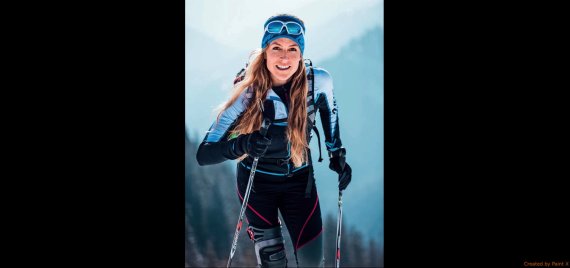
You'll have to explain your knee again: no cruciate ligaments, no LCL – where did they go?
Away! I did have a nervous avulsion above my knee. Then the nerve was transplanted. Thankfully, it's growing back now too; the transplant is slowly working. Right now that's my main workout: see that the nerve recovers completely and that I can completely trigger it with my mind. But since a nerve is very, very sensitive, we're only approaching the ligaments construction site when the nerve has recovered, when we know what our starting position for my knee is. For now, each additional surgery only means more trauma for the growing nerve. In the end, a completely regenerated nerve is the prerequisite for the success of additional surgery. So we're still right in the middle of the recovery process.
How do you trigger your knee nerve?
With quite a lot of thought training and power of imagination, with the help of good physical therapists, with special equipment, electrotherapy, sensory stimuli of every kind, with hot/cold therapy. I do several exercises where I imagine that I'm raising the nerve, and consequently trigger the receptors so that the nerve knows where it has to go, so it starts to work properly again.
And that after everything you have behind you: nine surgeries! What is your rehab program like?
My leg musculature is especially important right now, because I don't have any ligaments in my left knee to keep it stable. My femoral muscles were also partially torn off, and have to be retrimmed regularly. Above all, I still really have trouble with controlling the back of my legs. My gait still isn't completely rounded either, due to the busted nerve, and I have to do a lot of trunk training to correct the whole imbalance.
Sounds like a full-time job.
I go to rehab three times a week and to the physical therapist two times a month, I take a break for one day, and the remaining days I do something myself, like go to the mountain or something. That's when it does my psyche the most good. But ultimately it's all rehabilitational training for me right now. On the mountain, I make sure that I make a lot of guided motions, so it's top with ski mountaineering or biking. Then happily back down by train! Cross-country is good movement for my leg, too; everything that bulks up my muscles and stimulates that balancing, that gives the nerve sensory input again.
That means: ski mountaineering, not on foot?
Hiking uphill on foot is good in the summer, unfortunately downhill still doesn't work with the strain on my knee. Going for walks on level ground isn't too cool either, painful actually. By contrast, I still can't run at all, neither on the mountain nor on level ground. And I was a mountain jogger! Ski touring races at the same level as before still won't work right now either, naturally. Although I'm –I believe– back on my way on the mountain pretty quickly. I just can't go four or five hours at a stretch any more. When the cartilage gets strained for one to two hours, it gets run down – and then it hurts.
So far, we've spoken about your body. How is your head, your psyche doing?
My head is going along great. It's always looking ahead nicely. I'm totally fortunate that I'm an extremely positive person and can often see the bright side: that I survived the accident at all and that things have progress so well. After all, in the beginning I was given much different prognoses! Of course there are some days or stretches of days, but not weeks, where I'm not so cool about it and my knee really hurts again. But then I say to myself: 'Hey girl, chill out! You've been so lucky. You've come so far already. You're just not allowed to compare yourself with a healthy athlete anymore.'
Do you motivate yourself on your own, or do you also have professional help?
I have a super team around me: friends, family, physical therapists, and doctors who always have a cool quote for when it sometimes doesn't go so well.
No physical therapists?
Not anymore. I had them for a while at the beginning, the first six months. That was more about coping with the trauma. So, getting these images out of your head.
And? Are the images from the fall gone now?
They're gone in day-to-day life, yes. At most, they still come in a completely explicit situation: for example, when someone from the ski mountaineering group slips on a steep slope.
Has April 3rd, the day of the accident, remained a significant day?
Sure, that day changed my life. The day I almost would have died. But also the day I survived.
What will you do on that day?
I still don't know. I hope I'll be able to spend it with my husband, with friends and family. But maybe also by myself, maybe on the mountain, maybe a mix of all of the above. I'll just wait and see. I always plan everything extremely spontaneously. So far, I've taken the day off.
Do you have a need to go back to Iceland?
I'd already like to go back there. I thought the people were mega cool, the country is great – they can't help that I fell there. I would like to say thank you to the people who helped me. I'm still in touch with the mountain rescuer and the onsite nurses. I'd be happy to go back again, yes!
Even to the site of the accident?
I don't believe that I absolutely have to go back there exactly.
You do have to go on a book-signing tour for the book your wrote about your story: 'Sturz in die Tiefe' (Fall into the Deep). Your readings are mostly sold out...
I'm seriously excited: so much honest, lovely feedback! It's nice that I can inspire and touch a couple of people along the way! That's exactly my goal. It strengthens my resolve to get around the accident this way. Fun fact! It's not just a pure mountain book; rather, there are really honest insights into my emotional life. Every person is completely low in their life sometime, whether at their job, in private, or through an accident. Every person knows setbacks and defeats, and that's why the book speaks to so many people.
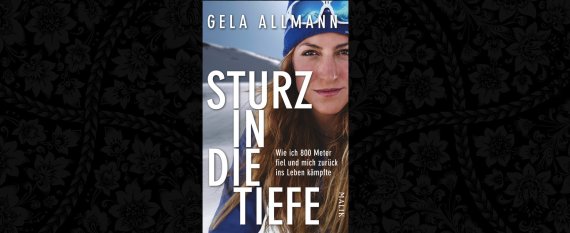
With your story, you're now also the predestined motivational trainer.
I'm absolutely crazy eager to do it! If anything good is to come from this accident, it's that now I can pass on my experiences this way. If my story helps people, it all makes sense again. After that kind of accident, you only want to do things that really make sense.
How do you see your future?
I realized: you can't plan life. I let it happen to me again and accept what comes my way. What's important now is making the right decisions for my leg. Then the rest will come on its own.
Film and talk by Angelika Allmann: Friday, April 22, 7:30 p.m in Schliersee, 9 euro entry, www.vitalwelt-schliersee.de, presale starts March 14 in the Bücher Oase in Schliersee and Bergsport Schachenmeier in Miesbach, ticket sale info also at: www.dav-schliersee.de
 OutDoor by ISPOOutDoor in transition
OutDoor by ISPOOutDoor in transition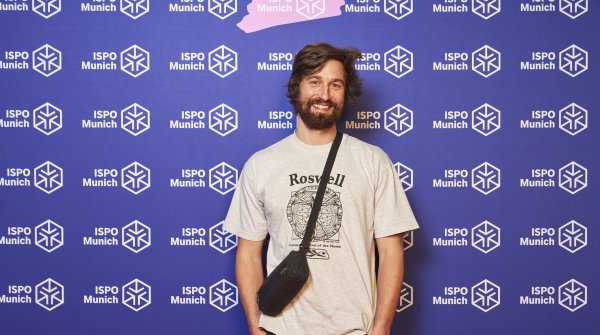
- ISPO awards
- Mountain sports
- Bike
- Design
- Retail
- Fitness
- Health
- ISPO Job Market
- ISPO Munich
- ISPO Shanghai
- Running
- Brands
- Sustainability
- Olympia
- OutDoor
- Promotion
- Sports Business
- ISPO Textrends
- Triathlon
- Water sports
- Winter sports
- eSports
- SportsTech
- OutDoor by ISPO
- Heroes
- Transformation
- Sport Fashion
- Urban Culture
- Challenges of a CEO
- Trade fairs
- Sports
- Find the Balance
- Product reviews
- Newsletter Exclusive Area
- Magazine

